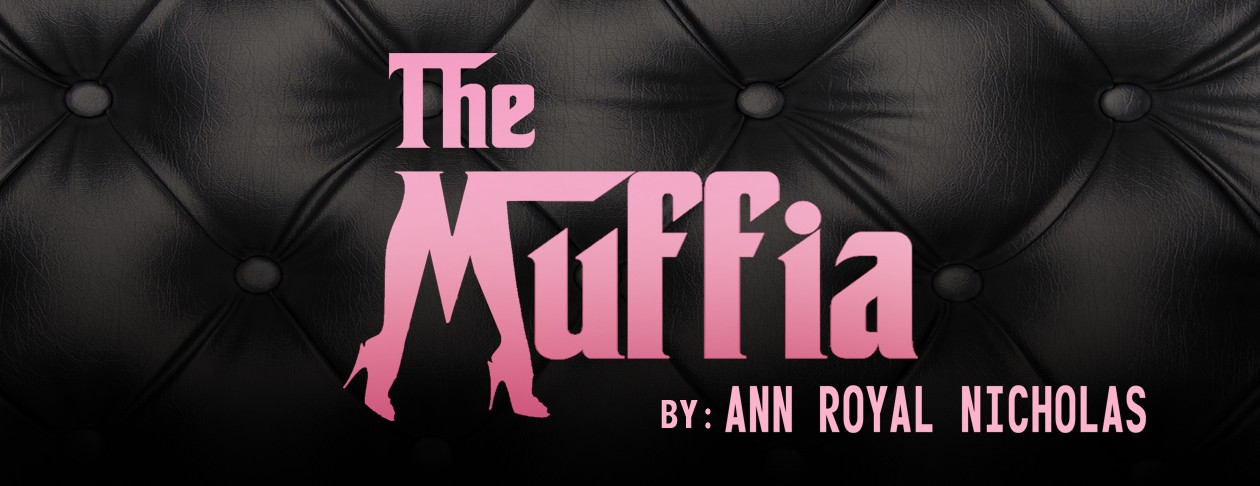Forget what you may have heard about The Muffia—banish the thoughts of lesbian pornographers and the militant English mums who expose bad mothering. The Muffia is, in fact, my Los Angeles based, all women’s book club. That’s right; we read books—not even particularly sexy books. Our Muffia came into existence in 2001, years before either of the other claimants despite the fact that The Muffia has just been released. Oh my, that sounds provocative doesn’t it? What I meant was that my novel, The Muffia, which is based on the Muffia book club, was released; not the Muff members themselves. We find release quite regularly, thank you.
It was after the twin towers fell. A group of us—friends for the most part—found ourselves talking about how life was suddenly more precious, our hold on it more tenuous. Tragedy has a way of bringing people closer so we weren’t unique in this. All of us, it seemed, sought greater connection. So we decided to start a book club. It was a way for us to come together and share our lives over a book we’d read, or, I should say, were supposed to have read. Somewhere along the way we started calling ourselves The Muffia.
There are 10 of us Muffs (in the book there are 7, which is hard enough to keep track of). And when we get together, we share so much more than books: Marriage, divorce, relationship drama; bar mitzvahs, births, deaths… menopause. When we meet, we always share a good meal and wine—often copious amounts of wine, which probably explains how we thought it was a good idea to call ourselves The Muffia.
The Muffia book club works and because I’m so grateful to be part of it, I will endeavor to provide some tips for making your existing book club more successful; or, if you’re thinking about starting a club, a few ideas you might want to consider before you do.
1) “Who” is your book club?
What brings you or holds you together? The key is finding what it is you share. Are you alumnae from college? Residents of a cul de sac? Certainly you share the love of reading but there has to be more to fall back on when the book conversation dies, which it will. The Muffs talk about everything, often very personal things. On those rare occasions when we’ve felt a book was not worth belaboring, we have been known to spend evenings talking about our kids or parents; or a Muff’s recent sexy escapade. This gets down to choosing the members of your book club. For me, this is the single biggest reason for The Muffia’s success: We like and respect each other. Though we’re certainly different and disagree about the books a lot, no Muff gets bent outa shape when another Muff tells her she’s full o’ fluff (expletive replaced). So build your book club to last.
2) Anticipate and head off conflict.
Even when you share an identity or focus with others in your club, if a certain member is disrespectful of others’ opinions or book choices then feelings get hurt. The Muffs have simply decided that a big reason we’re in a book club is to be introduced to books and opinions we might not have thought of ourselves. Therefore we are not to complain when a Muff picks a book that sounds unappealing. We have a South African Muff and without her, I never would have read Please Don’t Let’s Go to the Dogs Tonight by Alexandra Fuller. Yes, it’s an odd title but we all loved it. Sure, Muffs have picked a few duds as well but even then, we still get something out of them.
If you do have a “problem” member, one way to handle him or her is to hire a sort-of “moderator” who conducts the club like a class. Two of my friends are in this type of club and wouldn’t have it any other way. The leader ensures that those who are less forceful get a chance to speak and also acts as a buffer. Leaders often help choose a book and provide critique from outside sources. This wouldn’t work for The Muffia because the Muffs are all terribly opinionated and don’t really care about outside sources.
3) Share the duties.
A Muff doesn’t have duties other than her annual turn at hostess, which is hardly a chore. To be a hostess in The Muffia means you get to choose the book, organize the food and have book club come to your house. Good food and drink are great for putting people at ease and for getting the conversation going. The Muffia is no different. And we all make an effort to have delicious dishes and yummy desserts whenever we meet. There is the duty of scheduling, but the way we handle it is to know from the get-go that there will be multiple group emails with everyone weighing in. We thought about using an online scheduler but nixed the idea as too impersonal. Ultimately, we like the silly emails.
In a book club where there’s a leader, there are likely responsibilities such as dues collection or ordering food and these should probably be rotated so no one feels put upon. Again, it gets back to choosing your group wisely, genuinely liking the people in your book club and having some flexibility because being in a book club is supposed to be fun. (See #1 above)
4) Limit the guests.
When new people enter any established group it by necessity changes. The Muffia is made up entirely of women and we do not permit men. That said, we did have a male author once. We read J.R Moehringer’s memoir, The Tender Bar, because one of the Muffs knew him. It was a fun night despite the fact we had to curtail our ordinarily randy conversation (He probably would have been fascinated). Occasionally we have a female guest but ONLY if every Muff says yes and ONLY if she has read the book!
5) Watch out for “Big” books.
It’s probably smart not to choose books that are too long. Then again, some hefty volumes read fast and some short ones read slowly. A few Muffs are big readers and have chosen weighty tomes with no harmful effects. And guess what? It’s not the end of the world if people don’t finish a book. There’s no guarantee people will finish the book when it’s only 250 pages! There’s still a lot to talk about. That said, if a Muff shows up without having read the whole book, she has to expect spoilers—that’s her penance for not finishing. The thing is, she knows this going in and is sensible enough not to get annoyed.
Being part of a book club is not to be missed and the best book clubs are populated by people who bring out the best in you—like The Muffia does for me. Nurture those relationships, the stories you read and the stories you’re a part of. You’ll reap the rewards.
Do you belong to a book club? How do you make yours work? What was your book club’s favorite read?
Ann Royal Nicholas is a writer, actor and director whose career spans 30 years and is comprised of work for stage, film, television and individual consumption. She has contributed columns forVine Times and Touring & Tasting, as well as articles for Los Angeles Times and The Chronicle of the Horse. Her novel, Homegrown: The Terror Within (written under the pseudonym, Cialan Haasnic), is joined on shelves by The Muffia, the first of a “chick lit” series published by Water Street Press. Originally from the East Coast, Ann currently lives in Los Angeles with her son.
This piece first appeared as a guest post on the Shelf Pleasure blog. Shelf Pleasure: a destination spot for women who love reading (www.shelfpleasure.com)

The Muffia is available everywhere. 10% of all profits from book sales will be given to girls and women’s causes in the U.S. “Buy ‘The Muffia,’ help women.” If you know of any worthy groups, let us know who they are.
is available everywhere. 10% of all profits from book sales will be given to girls and women’s causes in the U.S. “Buy ‘The Muffia,’ help women.” If you know of any worthy groups, let us know who they are.
Is there a book you’ve read that you can’t stop talking about? Read is the spot to share your book recommendations, reviews, lists of absolute favorites, and thoughts on anything reading or writing related in general. Share yours here.
 I saw a film last night that should be required viewing for every woman who’s ever felt disempowered no matter her color, by every mother, by every judgmental school administrator, and by every male of every race. It’s called DOLORES and is the story of Dolores Huerta, the little-known mother of the Farmworkers union (to Cesar Chavez’s father) and eleven children. She, along with the farmworkers, forced change at a time when the growers refused to consider their workers more than slaves. She demanded better treatment in the fields, that workers not be sprayed by pesticides, that they be paid fairly and that they have clean, safe places to live. She was a friend of Bobby Kennedy’s who’d taken up the farmworkers’ cause and was by his side when he was assassinated at LA’s Ambassador Hotel. She later fought for women’s rights, LGBGT rights and was one of Hillary’s surrogates in the last election. Today she is still fighting at 87. It’s just what and who she is, and she’s never let the fact that she is both Latin and female get in her way despite daunting obstacles, both outside and even within her own patriarchal community. Peter Bratt, the film’s director, made the film at the urging of Carlos Santana, and it took 5 years to complete. Bratt was there last night, fielding questions from many with connection to Dolores or knew her story (I did not). One person sitting in the audience at the NW Film Center was a former attorney, named Art Johnson. He was the lead prosecutor against the San Francisco Police Department after one of its officers took a baton to Dolores (over 50 at the time and not a threatening presence) during a protest, beating her and landing her in the hospital with life-threatening injuries (you see it happen in the film). Johnson, clearly moved and fighting tears, rose to tell the story of how he and his team won a settlement from the SF police department and when he told Dolores the terms, which would pay her to $2000 a month for life, her response was, “This isn’t about the money, but we’ll use it to reform the police department.” When she recovered, she did that, culminating in an entirely new policy and rulebook for the department. It was Dolores who came up with the call to action, “Si se puede,” making the farmworkers believe they could make change happen. You’ll recognize the call as, “Yes We Can,” used by Barack Obama (he gave her credit) in the lead up to election. In this horrific political climate we find ourselves in in 2017, the film gave me inspiration to resume the fight. It’s traveling the country and will air on PBS next Spring. #shepersists #couldabeenamuff
I saw a film last night that should be required viewing for every woman who’s ever felt disempowered no matter her color, by every mother, by every judgmental school administrator, and by every male of every race. It’s called DOLORES and is the story of Dolores Huerta, the little-known mother of the Farmworkers union (to Cesar Chavez’s father) and eleven children. She, along with the farmworkers, forced change at a time when the growers refused to consider their workers more than slaves. She demanded better treatment in the fields, that workers not be sprayed by pesticides, that they be paid fairly and that they have clean, safe places to live. She was a friend of Bobby Kennedy’s who’d taken up the farmworkers’ cause and was by his side when he was assassinated at LA’s Ambassador Hotel. She later fought for women’s rights, LGBGT rights and was one of Hillary’s surrogates in the last election. Today she is still fighting at 87. It’s just what and who she is, and she’s never let the fact that she is both Latin and female get in her way despite daunting obstacles, both outside and even within her own patriarchal community. Peter Bratt, the film’s director, made the film at the urging of Carlos Santana, and it took 5 years to complete. Bratt was there last night, fielding questions from many with connection to Dolores or knew her story (I did not). One person sitting in the audience at the NW Film Center was a former attorney, named Art Johnson. He was the lead prosecutor against the San Francisco Police Department after one of its officers took a baton to Dolores (over 50 at the time and not a threatening presence) during a protest, beating her and landing her in the hospital with life-threatening injuries (you see it happen in the film). Johnson, clearly moved and fighting tears, rose to tell the story of how he and his team won a settlement from the SF police department and when he told Dolores the terms, which would pay her to $2000 a month for life, her response was, “This isn’t about the money, but we’ll use it to reform the police department.” When she recovered, she did that, culminating in an entirely new policy and rulebook for the department. It was Dolores who came up with the call to action, “Si se puede,” making the farmworkers believe they could make change happen. You’ll recognize the call as, “Yes We Can,” used by Barack Obama (he gave her credit) in the lead up to election. In this horrific political climate we find ourselves in in 2017, the film gave me inspiration to resume the fight. It’s traveling the country and will air on PBS next Spring. #shepersists #couldabeenamuff









